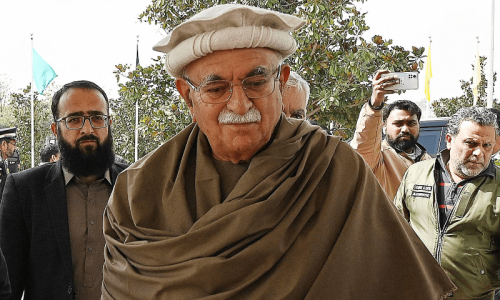WASHINGTON, May 31: The Indo-US nuclear deal would encourage China to have a similar arrangement with Pakistan, says prominent US scholar Noam Chomsky. In an interview published by several US media outlets, Mr Chomsky also reviews India-Pakistan relations, observing that for a durable relationship between the two neighbours it is important to resolve the Kashmir dispute.
Mr Chomsky, an internationally renowned linguist, author and foreign policy expert, recalled that shortly after the US and India signed the nuclear deal, China approached Pakistan with sort of a similar agreement.
He warned that the US desire to sell advanced military equipment to India could lead to a dangerous arms race in South Asia. “If India gets more advanced offensive military equipment, Pakistan will want the same, and China will want the same,” he said.
The Indo-US nuclear deal, he said, was “a sharp blow” to the international system created to prevent proliferation of nuclear weapons and missile technologies.
“It is predictable that as soon as the US broke it, someone else would break it too … once you open the door, others are going to follow.”
Mr Chomsky noted that while there has been an obvious improvement in India-Pakistan relations, there were a couple of major problems that need to be dealt with.
“One of them, of course, is Kashmir. The question is, can they figure out a joint solution to the Kashmir conflict,” he said.
Mr Chomsky said that Kashmir was not just a territorial issue but also had an “identity factor”.
“The Muslim population and the Hindu population do separate on those lines. Does that mean they have to be broken up? Not necessarily. There are 160 million Muslims living in India. There has been tension and some serious atrocities but it has been over the centuries a reasonably integrated society,” he added.
Mr Chomsky noted “a willingness” in both India and Pakistan to “put aside what could be major tensions, like a terrorist operation in Mumbai or something attributed to Pakistanis”.
Improvement in India’s relations with China, he said may also help Islamabad and New Delhi overcome some of their conflicts.
Explaining the current trend of extremism in South Asia, Mr Chomsky described the rise of Hindu fundamentalism in India as “a very dangerous development”.
“One of the roots of the BJP is a quasi-fascist Hindu extremist movement. And for India that is extremely dangerous. These are very dangerous movements. They are not inherently destructive. They could take a constructive path but that's not the way they usually develop.
“How do you combat them? The same way you combat any other dangerous movement: education, organisation, looking at the issues that make them arise. Often they arise out of real or perceived oppression, as a reaction to it.”













































Dear visitor, the comments section is undergoing an overhaul and will return soon.